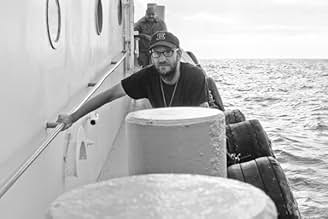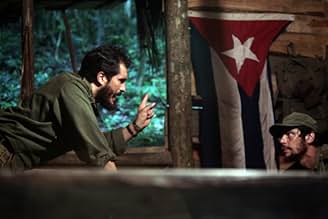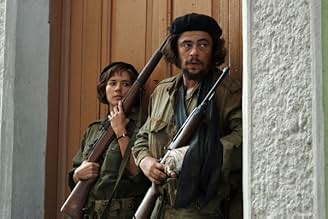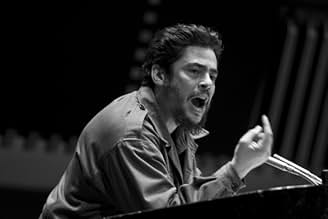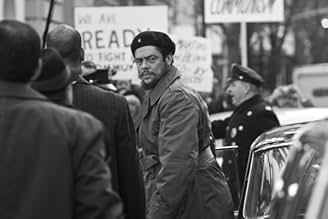IMDb-BEWERTUNG
7,1/10
49.148
IHRE BEWERTUNG
1956 mobilisieren Ernesto "Che" Guevara und eine Gruppe von Castro-geführten Exilkubanern eine Armee, um das Regime des Diktators Fulgencio Batista zu stürzen.1956 mobilisieren Ernesto "Che" Guevara und eine Gruppe von Castro-geführten Exilkubanern eine Armee, um das Regime des Diktators Fulgencio Batista zu stürzen.1956 mobilisieren Ernesto "Che" Guevara und eine Gruppe von Castro-geführten Exilkubanern eine Armee, um das Regime des Diktators Fulgencio Batista zu stürzen.
- Regie
- Drehbuch
- Hauptbesetzung
- Auszeichnungen
- 4 Gewinne & 13 Nominierungen insgesamt
Oscar Isaac
- Interpreter
- (as Óscar Isaac)
María Isabel Díaz Lago
- María Antonia
- (as María Isabel Díaz)
Demián Bichir
- Fidel Castro
- (as Demian Bichir)
Ramon Fernandez
- Héctor
- (as Ramón Fernández)
Yul Vazquez
- Alejandro Ramírez
- (as Yul Vázquez)
Jsu Garcia
- Jorge Sotús
- (as Jsu García)
Luis Alfredo Rodríguez Sánchez
- Rebel Messenger #1
- (as Luis Rodríguez Sánchez)
Roberto Santana
- Juan Almeida
- (as Roberto Luis Santana)
Empfohlene Bewertungen
Ironically the most talked-about American film in the 2008 New York Film Festival is 98% in Spanish. The extra-long film's controversy began at the Cannes Festival. There were love-hate notices, and considerable doubts about commercial prospects. As consolation the star, Benicio Del Toro, got the Best Actor award there. I'm talking about Steven Soderbergh's 'Che,' of course. That's the name it's going by in this version, shown in New York as at Cannes in two 2-hour-plus segments without opening title or end credits. 'Che' is certainly appropriate since Ernesto "Che" Guevara is in almost every scene. Del Toro is impressive, hanging in reliably through thick and thin, from days of glorious victory in part one to months of humiliating defeat in part two, appealing and simpatico in all his varied manifestations, even disguised as a bald graying man to sneak into Bolivia. It's a terrific performance; one wishes it had a better setting.
If you are patient enough to sit through the over four hours, with an intermission between the two sections, there are rewards. There's an authentic feel throughout--fortunately Soderbergh made the decision to film in Spanish (though some of the actors, oddly enough in the English segments especially, are wooden). You get a good outline of what guerrilla warfare, Che style, was like: the teaching, the recruitment of campesinos, the morality, the discipline, the hardship, and the fighting--as well as Che's gradual morphing from company doctor to full-fledged military leader. Use of a new 9-pound 35 mm-quality RED "digital high performance cine camera" that just became available in time for filming enabled DP Peter Andrews and his crew to produce images that are a bit cold, but at times still sing, and are always sharp and smooth.
The film is in two parts--Soderbergh is calling them two "films," and the plan is to release them commercially as such. First is The Argentine, depicting Che's leadership in jungle and town fighting that led up to the fall of Havana in the late 50's, and the second is Guerrilla, and concerns Che's failed effort nearly a decade later in Bolivia to spearhead a revolution, a fruitful mission that led to Guevara's capture and execution in 1967. The second part was to have been the original film and was written first and, I think, shot first. Producer Laura Bickford says that part two is more of a thriller, while part one is more of an action film with big battle scenes. Yes, but both parts have a lot in common--too much--since both spend a large part of their time following the guerrillas through rough country. Guerrilla an unmitigated downer since the Bolivian revolt was doomed from the start. The group of Cubans who tried to lead it didn't get a friendly reception from the Bolivian campesinos, who suspected foreigners, and thought of the Cuban communists as godless rapists. There is a third part, a kind of celebratory black and white interval made up of Che's speech at the United Nations in 1964 and interviews with him at that time, but that is inter-cut in the first segment. The first part also has Fidel and is considerably more upbeat, leading as it does to the victory in Santa Clara in 1959 that led to the fall of the dictatorship of Fulgencio Batista in Cuba.
During 'Guerilla' I kept thinking how this could indeed work as a quality European-style miniseries, which might begin with a shortened version of Walter Salles's 'Motorcycle Diaries' and go on to take us to Guevara's fateful meeting with Fidel in Mexico and enlistment in the 26th of July Movement. There could be much more about his extensive travels and diplomatic missions. This is far from a complete picture of the man, his childhood interest in chess, his lifelong interest in poetry, the books he wrote; even his international fame is only touched on. And what about his harsh, cruel side? Really what Soderbergh is most interested in isn't Che, but revolution, and guerrilla warfare. The lasting impression that the 4+ hours leave is of slogging through woods and jungle with wounded and sick men and women and idealistic dedication to a the cause of ending the tyranny of the rich. Someone mentioned being reminded of Terrence Malick's 'The Tin Red Line,' and yes, the meandering, episodic battle approach is similar; but 'The Thin Red Line' has stronger characters (hardly anybody emerges forcefully besides Che), and it's a really good film. This is an impressive, but unfinished and ill-fated, effort.
This 8-years-gestating, heavily researched labor of love (how many more Ocean's must come to pay for it?) is a vanity project, too long for a regular theatrical release and too short for a miniseries. Radical editing--or major expansion--would have made it into something more successful, and as it is it's a long slog, especially in the second half.
It's clear that this slogging could have been trimmed down, though it's not so clear what form the resulting film would have taken--but with a little bit of luck it might have been quite a good one.
If you are patient enough to sit through the over four hours, with an intermission between the two sections, there are rewards. There's an authentic feel throughout--fortunately Soderbergh made the decision to film in Spanish (though some of the actors, oddly enough in the English segments especially, are wooden). You get a good outline of what guerrilla warfare, Che style, was like: the teaching, the recruitment of campesinos, the morality, the discipline, the hardship, and the fighting--as well as Che's gradual morphing from company doctor to full-fledged military leader. Use of a new 9-pound 35 mm-quality RED "digital high performance cine camera" that just became available in time for filming enabled DP Peter Andrews and his crew to produce images that are a bit cold, but at times still sing, and are always sharp and smooth.
The film is in two parts--Soderbergh is calling them two "films," and the plan is to release them commercially as such. First is The Argentine, depicting Che's leadership in jungle and town fighting that led up to the fall of Havana in the late 50's, and the second is Guerrilla, and concerns Che's failed effort nearly a decade later in Bolivia to spearhead a revolution, a fruitful mission that led to Guevara's capture and execution in 1967. The second part was to have been the original film and was written first and, I think, shot first. Producer Laura Bickford says that part two is more of a thriller, while part one is more of an action film with big battle scenes. Yes, but both parts have a lot in common--too much--since both spend a large part of their time following the guerrillas through rough country. Guerrilla an unmitigated downer since the Bolivian revolt was doomed from the start. The group of Cubans who tried to lead it didn't get a friendly reception from the Bolivian campesinos, who suspected foreigners, and thought of the Cuban communists as godless rapists. There is a third part, a kind of celebratory black and white interval made up of Che's speech at the United Nations in 1964 and interviews with him at that time, but that is inter-cut in the first segment. The first part also has Fidel and is considerably more upbeat, leading as it does to the victory in Santa Clara in 1959 that led to the fall of the dictatorship of Fulgencio Batista in Cuba.
During 'Guerilla' I kept thinking how this could indeed work as a quality European-style miniseries, which might begin with a shortened version of Walter Salles's 'Motorcycle Diaries' and go on to take us to Guevara's fateful meeting with Fidel in Mexico and enlistment in the 26th of July Movement. There could be much more about his extensive travels and diplomatic missions. This is far from a complete picture of the man, his childhood interest in chess, his lifelong interest in poetry, the books he wrote; even his international fame is only touched on. And what about his harsh, cruel side? Really what Soderbergh is most interested in isn't Che, but revolution, and guerrilla warfare. The lasting impression that the 4+ hours leave is of slogging through woods and jungle with wounded and sick men and women and idealistic dedication to a the cause of ending the tyranny of the rich. Someone mentioned being reminded of Terrence Malick's 'The Tin Red Line,' and yes, the meandering, episodic battle approach is similar; but 'The Thin Red Line' has stronger characters (hardly anybody emerges forcefully besides Che), and it's a really good film. This is an impressive, but unfinished and ill-fated, effort.
This 8-years-gestating, heavily researched labor of love (how many more Ocean's must come to pay for it?) is a vanity project, too long for a regular theatrical release and too short for a miniseries. Radical editing--or major expansion--would have made it into something more successful, and as it is it's a long slog, especially in the second half.
It's clear that this slogging could have been trimmed down, though it's not so clear what form the resulting film would have taken--but with a little bit of luck it might have been quite a good one.
Nothing quite like getting your teeth into an epic is there? Sitting back and letting yourself get immersed into a struggle, a journey, in this case the Cuban revolution that has become such a cause celebre for many since the 1950s. By the time I left the cinema I sadly felt as though the epic had been squashed down into an easily swallowed period piece with all the epic grandeur of a Dan Brown novel. The problem with Che Part One is that it doesn't say anything particularly interesting or contain any memorable moments. There is lots and lots of shooting which is actually fairly sanitised (this is certainly no Saving Private Ryan), there is some mistreatment of people who are then avenged and there are lots of shots of Benicio del Toro looking quite idealistic and cool.
Don't get me wrong, there is nothing specifically wrong with this film. It portrays a fairly accurate (if, as I said, sanitised) picture of the March on Santa Clara and the victory of Castro's rebels. However much in the same way as the kind of perpetually running museum film that you can dip in and out of it is largely uninspiring and leaves you feeling quite detached. The problem is not the direction or the acting which does manage to transport you into the heart of a Civil War ravaged Cuba. It is the fact that we learn next to nothing about Cuba, Che himself or the goals of the revolutionaries. We learn nothing of why the Batista regime was so bad that people wanted to overthrow it. Which means that this simply stands alone as a war film where there are lots of explosions, lots of running around and some scenes of people celebrating in the streets. While I understand from reports that Che Part Two is rather different I think that nevertheless the slight blandness of Che Part One means that, though it looks good, it does feel like a rather wasted opportunity.
Don't get me wrong, there is nothing specifically wrong with this film. It portrays a fairly accurate (if, as I said, sanitised) picture of the March on Santa Clara and the victory of Castro's rebels. However much in the same way as the kind of perpetually running museum film that you can dip in and out of it is largely uninspiring and leaves you feeling quite detached. The problem is not the direction or the acting which does manage to transport you into the heart of a Civil War ravaged Cuba. It is the fact that we learn next to nothing about Cuba, Che himself or the goals of the revolutionaries. We learn nothing of why the Batista regime was so bad that people wanted to overthrow it. Which means that this simply stands alone as a war film where there are lots of explosions, lots of running around and some scenes of people celebrating in the streets. While I understand from reports that Che Part Two is rather different I think that nevertheless the slight blandness of Che Part One means that, though it looks good, it does feel like a rather wasted opportunity.
He was a revolutionary fighter, a doctor, a social philosopher and a martyr who turned to armed warfare as a 'necessary' means of stamping out the foreign complexities, poverty and injustice that had bled South America for centuries. He was a Marxist, a writer, a guerrilla and a diplomat who rose to prominence as a leader of Fidel Castro's radical '26th of July Movement': a left wing political party that launched an armed invasion of Cuba rapt on toppling U.S backed dictator Fulgencio Batista. This historical revolt: the focal point of director Steven Soderbergh's enduring, coarse and superbly crafted part one of two biopic. A sometimes bitty, sometimes brilliant hand-held epic that succeeds in its failure to fall into the consumer culture camp that's exploited Ernesto 'Che' Guevara's image now for so long.
Steven Soderbergh refrains, then, from counteracting the magnitude of Che: Part One's dense political platform by ramping up the fireworks. This wont appeal to mainstream viewers. This is not a Cuban Braveheart. This is not some twisted Scarface prequel. There will be no post-movie pop-art. Che: Part One is an intelligent and vital take on the man behind the myth not a balls-to-the-wall action spectacle blaring with blood, bullets and CGI. It's a thorough and naturalistic treatise on iconic human drive and endeavour that infrequently shuttles between monochrome and Technicolor, between Che Guevara's 1964 delegation at the UN headquarters and time spent trudging through the Cuban jungle.
If your understanding of certain political ideals and movements are, at best, hazy- then it's best to steer clear of this one. You're likely are likely to find the first serving of Soderbergh's four-and-a-half-hour, two part political epic a little confusing. This ain't no Hollywood funded, slick and stylish, over-dramatic chronicle concerned with entertainment or income. This isn't 'Defiance' or 'Valkrye'. This is a well-researched, claustrophobic and paced political drama (shot in Spanish) where spurts of action, violence and humour are few and far between. Imagine Oliver Stone's 'Salvador' by the way of Terrance Mallick's 'The Thin Red Line': fragmented, anti-mainstream and very heavy-going.
The bravura Benicio Del Toro stars as Che and is quite excellent. He delivers a focused and unwavering performance worthy of a thousand accolades: his finest since '21 Grams'. The fact that Del Toro is fluent in Spanish also helps, as does a rallying and unknown supporting cast that work well as a low-key ensemble. It's all about Del Toro, though. His insurgent, intense and convincing Che is one marred by crippling bouts of asthma yet defined by a burning desire to educate and reform- to put his litigious beliefs into action and unite Latin America.
With Che: Part One, the diligent Steven Soderbergh has found his blend of realism and narrative, documentary and drama. As an avid Che fan and reader of his books and biographies, there is little doubt in my mind that this monumental work will stand as the first piece in the definitive two part screen portrait of one the twentieth century's most iconic, yet largely uncharted, political figures.
Final Verdict: While lesser films wallow in the limelight, Che: Part One stirs understated in the shadows seemingly content with the fact that it wont appeal to all, or many. Steven Soderbergh has crafted a very loyal and well-made biopic. One that demythologises, one that educates, one that excels and ensues Walter Salle's soul-searching Che preface: The Motorcycle Diaries.
Steven Soderbergh refrains, then, from counteracting the magnitude of Che: Part One's dense political platform by ramping up the fireworks. This wont appeal to mainstream viewers. This is not a Cuban Braveheart. This is not some twisted Scarface prequel. There will be no post-movie pop-art. Che: Part One is an intelligent and vital take on the man behind the myth not a balls-to-the-wall action spectacle blaring with blood, bullets and CGI. It's a thorough and naturalistic treatise on iconic human drive and endeavour that infrequently shuttles between monochrome and Technicolor, between Che Guevara's 1964 delegation at the UN headquarters and time spent trudging through the Cuban jungle.
If your understanding of certain political ideals and movements are, at best, hazy- then it's best to steer clear of this one. You're likely are likely to find the first serving of Soderbergh's four-and-a-half-hour, two part political epic a little confusing. This ain't no Hollywood funded, slick and stylish, over-dramatic chronicle concerned with entertainment or income. This isn't 'Defiance' or 'Valkrye'. This is a well-researched, claustrophobic and paced political drama (shot in Spanish) where spurts of action, violence and humour are few and far between. Imagine Oliver Stone's 'Salvador' by the way of Terrance Mallick's 'The Thin Red Line': fragmented, anti-mainstream and very heavy-going.
The bravura Benicio Del Toro stars as Che and is quite excellent. He delivers a focused and unwavering performance worthy of a thousand accolades: his finest since '21 Grams'. The fact that Del Toro is fluent in Spanish also helps, as does a rallying and unknown supporting cast that work well as a low-key ensemble. It's all about Del Toro, though. His insurgent, intense and convincing Che is one marred by crippling bouts of asthma yet defined by a burning desire to educate and reform- to put his litigious beliefs into action and unite Latin America.
With Che: Part One, the diligent Steven Soderbergh has found his blend of realism and narrative, documentary and drama. As an avid Che fan and reader of his books and biographies, there is little doubt in my mind that this monumental work will stand as the first piece in the definitive two part screen portrait of one the twentieth century's most iconic, yet largely uncharted, political figures.
Final Verdict: While lesser films wallow in the limelight, Che: Part One stirs understated in the shadows seemingly content with the fact that it wont appeal to all, or many. Steven Soderbergh has crafted a very loyal and well-made biopic. One that demythologises, one that educates, one that excels and ensues Walter Salle's soul-searching Che preface: The Motorcycle Diaries.
Maybe the most refreshing thing about Che, both parts, is that its director, Steven Soderbergh, didn't know anything about Ernesto "Che" Guevara before taking on the project. This is like a good few in the audience, like yours truly. I didn't know much at all about Che except that he was involved with communist uprisings and revolutions, was buddy-buddy with Castro, and died in execution-style as a guerrilla (that, and his image appears on t-shirts everywhere). What Soderbergh provides for an audience that will go to see it for what he will do with the project- and what Benicio Del-Toro does with the character- is that it's a history lesson made vibrant and urgent and passionate and, according to the director in interviews and Q & A's, honest portrayal of events.
If this means that we may not get exactly a fully rounded portrait of its titular protagonist/hero, then that's probably the only real liability that the picture has. Maybe, perhaps, rightfully so; Che wasn't a guy, at least in his prime revolutionary years, to be one that had much warmth or moments of doubt (and if he had them, they were behind closed doors and out of any record of diaries). So what we get in Part 1, the conventional "Rise" of the character in the story, is the tale of how to do a revolution right- or rather, how to take over a government by military force, and it's Che as a man who pretty quickly becomes a natural leader, a stern taskmaster and also someone who "loves" as a revolutionary must, Che says.
It's gripping film-making nevertheless, with Soderbergh commanding the narrative wonderfully between a color-filmed part-digital-part-35mm Red-camera on the 1957-1959 events in Cuba and the 1964 trip to the UN in New York filmed in grainy black and white. What we get is part documentary and part bio-pic, words straight from the guerrilla's mouth, as it were, and the events that led up to the take-over (which serves as the climax of the picture) in Santa Clara, Cuba. Some of the elements, as noted, are conventional of just a war picture: we get the young kids (16 and 14) who will do anything to fight with Guevara and his group; we get the supposed love interest, only (thankfully) muted with only one scene with small talk; and we get the moments of enthusiasm, humor, camaraderie, and unlikely bravery in the heat of battle.
But most importantly we see Benicio del-Toro take command of this role like he does seemingly often but rarely with such force. In fact, he probably elevates this Che past some possible pit-falls (this project was actually his baby, as he serves as co-producer and developed the project for years), and makes him as human as he can be, using Che's health-tic (asthma) to its fullest, and reveling in going for broke as far as gusto and revelation go. For all of Soderbergh's command of the film-making style- most of all, for me, during the climactic battle where we get to see him awesomely direct a battle sequence- del-Toro, for any scene he's in, steals the show. If for nothing else, whatever your political stance or thoughts on Che, he's worth the admission. 8.5/10
If this means that we may not get exactly a fully rounded portrait of its titular protagonist/hero, then that's probably the only real liability that the picture has. Maybe, perhaps, rightfully so; Che wasn't a guy, at least in his prime revolutionary years, to be one that had much warmth or moments of doubt (and if he had them, they were behind closed doors and out of any record of diaries). So what we get in Part 1, the conventional "Rise" of the character in the story, is the tale of how to do a revolution right- or rather, how to take over a government by military force, and it's Che as a man who pretty quickly becomes a natural leader, a stern taskmaster and also someone who "loves" as a revolutionary must, Che says.
It's gripping film-making nevertheless, with Soderbergh commanding the narrative wonderfully between a color-filmed part-digital-part-35mm Red-camera on the 1957-1959 events in Cuba and the 1964 trip to the UN in New York filmed in grainy black and white. What we get is part documentary and part bio-pic, words straight from the guerrilla's mouth, as it were, and the events that led up to the take-over (which serves as the climax of the picture) in Santa Clara, Cuba. Some of the elements, as noted, are conventional of just a war picture: we get the young kids (16 and 14) who will do anything to fight with Guevara and his group; we get the supposed love interest, only (thankfully) muted with only one scene with small talk; and we get the moments of enthusiasm, humor, camaraderie, and unlikely bravery in the heat of battle.
But most importantly we see Benicio del-Toro take command of this role like he does seemingly often but rarely with such force. In fact, he probably elevates this Che past some possible pit-falls (this project was actually his baby, as he serves as co-producer and developed the project for years), and makes him as human as he can be, using Che's health-tic (asthma) to its fullest, and reveling in going for broke as far as gusto and revelation go. For all of Soderbergh's command of the film-making style- most of all, for me, during the climactic battle where we get to see him awesomely direct a battle sequence- del-Toro, for any scene he's in, steals the show. If for nothing else, whatever your political stance or thoughts on Che, he's worth the admission. 8.5/10
Che: Part One felt very complete and fulfilling. I found myself looking at Ernesto "Che" Guevara as a very well rounded person. Not as an ideological self fulfilling man but as an articulate man with thought out rational decisions as well as a man with many useful talents.
The acting of the cast all around was very good but Benicio Del Toro took the movie by storm but he did this in a very subtle way. His performance displayed how Che's spirit was able to superseded the hardships faced in the Cuban Revolution. It did not display any brutality or recklessness but a devotion to a cause. Del Toro's perforations was that worthy of an Oscar nomination but I don't think Che Guervara cared to much about awards.
The directing by Steven Soderbergh was visually stunning at times with much of the scenes shot in the forest. What kept the movie upbeat though were the scenes of Che in New York giving interviews and addressing the U.N. It added an extra layer to the film allowing you to see another side of Che. The side in which he shows his political and speaking abilities. The writing was very good with the dialog always keeping you engrossed. The music, though not much of it, was very good and stayed within rhythm of the rest of the film.
Overall the film succeeds in showing Che as a well rounded man never developing into oversimplified or unnecessarily complex portrayal of a man. The movie was very accurate and refused to take on a role of being inspiring or Hollywoodish which I enjoyed. The only problem with the film I had was that it seems to have a little too much of a feel of a war film rather than a biopic. Still I highly recommend this film.
The acting of the cast all around was very good but Benicio Del Toro took the movie by storm but he did this in a very subtle way. His performance displayed how Che's spirit was able to superseded the hardships faced in the Cuban Revolution. It did not display any brutality or recklessness but a devotion to a cause. Del Toro's perforations was that worthy of an Oscar nomination but I don't think Che Guervara cared to much about awards.
The directing by Steven Soderbergh was visually stunning at times with much of the scenes shot in the forest. What kept the movie upbeat though were the scenes of Che in New York giving interviews and addressing the U.N. It added an extra layer to the film allowing you to see another side of Che. The side in which he shows his political and speaking abilities. The writing was very good with the dialog always keeping you engrossed. The music, though not much of it, was very good and stayed within rhythm of the rest of the film.
Overall the film succeeds in showing Che as a well rounded man never developing into oversimplified or unnecessarily complex portrayal of a man. The movie was very accurate and refused to take on a role of being inspiring or Hollywoodish which I enjoyed. The only problem with the film I had was that it seems to have a little too much of a feel of a war film rather than a biopic. Still I highly recommend this film.
Wusstest du schon
- WissenswertesFor his role, Benicio Del Toro spent seven years researching Guevara's life.
- PatzerWhen the guerrilleros are in the Sierra Maestra, we can hear the coqui (Eleutherodactylus coqui) singing in the night. However, this small frog is endemic to Puerto Rico and the Virgin Islands, thus not possible to be heard in Cuba.
- Zitate
Lisa Howard: What is the most important quality for a revolutionary to possess?
Ernesto Che Guevara: El amor.
Cuban Diplomat #1: [translating] Love.
Lisa Howard: Love?
Cuban Diplomat #1: Love of humanity... of justice and truth. A real revolutionary goes where he is needed.
- VerbindungenFeatured in Así se hizo - Che El Argentino (2008)
- SoundtracksBasura
Written and Performed by Mark A. Mangini (as Mark Mangini)
Top-Auswahl
Melde dich zum Bewerten an und greife auf die Watchlist für personalisierte Empfehlungen zu.
Details
Box Office
- Budget
- 35.000.000 $ (geschätzt)
- Bruttoertrag in den USA und Kanada
- 748.555 $
- Eröffnungswochenende in den USA und in Kanada
- 61.070 $
- 14. Dez. 2008
- Weltweiter Bruttoertrag
- 34.209.066 $
- Laufzeit
- 2 Std. 14 Min.(134 min)
- Farbe
- Sound-Mix
- Seitenverhältnis
- 2.39 : 1
Zu dieser Seite beitragen
Bearbeitung vorschlagen oder fehlenden Inhalt hinzufügen

